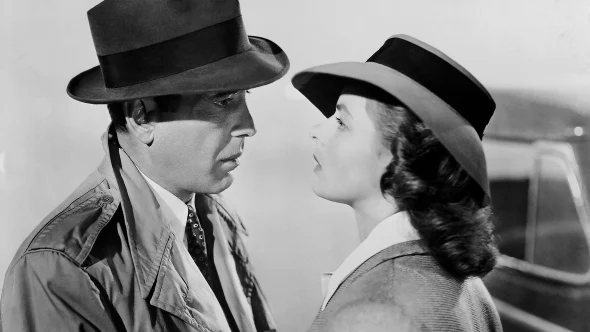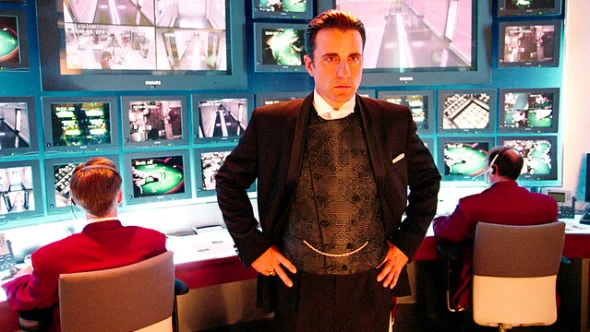
Filmmaker Abi Damaris Corbin remembers what it meant to go to the movie theater as a kid. Growing up in South Boston as the youngest of five children, "It took a lot for us to go to the cinema as kids," she remembers, "so it meant so much. I feel the responsibility of that every time I make something."
Corbin's feature directorial debut is Breaking, the tragic true story of Brian Brown-Easley (played in the movie by John Boyega), a Marine Corps veteran who resorts to holding a bank hostage after the Department of Veterans Affairs denies him the disability payment that he's owed. Her thriller, co-starring Nicole Beharie, Selenis Leyva, Connie Britton, and the late Michael K. Williams, won the Special Jury Award for Ensemble Cast when the film premiered at Sundance earlier this year.
"I want to tell stories that are unusual and wild and that I haven't seen on-screen. I want to tell stories that are about heart and hope," says the director (who co-wrote Breaking with Kwame Kwei-Armah). "I'm hopeful that, as this film launches, it will allow me to continue telling stories about people who can't find a way to mattering, and showing the value of their life, that you can move the machine."
Below, Corbin shares with A.frame five of the movies that have moved her throughout her life and made her into the filmmaker that she is today.

Directed by: Michael Curtiz | Written by: Julius J. Epstein, Philip G. Epstein and Howard Koch
Casablanca is the first film that I delved into as a filmmaker. I storyboarded it out, just watching it frame by frame. The blocking is impeccable. The way that it's shot is exceptional. The sequence that introduces Rick in the very opening is masterfully done — if you watch the dolly shot leading to Sam at the piano, it tells you so much information with just the way that it's shot. Beyond that, the way that the black-and-white is captured on film, the lighting, the shape of it. I learned a lot about how to shoot from that film.

Directed by: Steven Soderbergh | Written by: Ted Griffin
This was the first boxed set of films that I ever bought. I was working at a florist in Boston when I was too young to be working there. It was a little illegal, but a kid's got to make money! I took some of that money and I bought the Ocean's boxed set, and I watched those movies over, and over, and over, and over, and over, and over, and over, and over again. I still will put Ocean's Eleven on in the background as a comfort thing for me while I'm working.
I learned about how actors handle dialogue and character from that film — Brad Pitt is always eating, and it adds such a naturalism to his performance there — and there's such an ensemble camaraderie that's so easy. The editing is also really sharp in that film, and the pacing, you see the tension that is captured there is so tight. That film's just in my DNA at this point.

Directed by: Danny Boyle | Written by: Simon Beaufoy
I saw this when it came out, and I'd never seen anything like it. This film hit me in a really visceral way when I watched it, because it exposed me to a culture I didn't know too much of. The music blew me away, and the dance — it rips you inside out, it breaks your heart, and it does so in a way that makes you laugh, that makes you cry, that makes you want to be better, do better.
I love Danny Boyle as a filmmaker. I love that he, as a director, wants you to push the pram. As a filmmaker, there's so much that went right there that I had to learn about it, because he broke the mold. To a degree, that is really the contract you make with your audience. 'I'm going to make you feel something that you need to feel, that allows you to process in a new way, that makes space for you to have a catharsis.' That's Slumdog.

Directed by: Ridley Scott | Written by: David Franzoni, John Logan and William Nicholson
First off: Epic. The beauty of the film is so inspiring to me. It captures straight-up poetry, and Ridley Scott says so much with so little. I'm a little bit obsessed with Russell Crowe, and this character, and how he made that work. Because there's so much that could go wrong — if you go a little bit left, it ends up trite. It ends up a soap opera. Instead, it becomes this thing that pierces you through.
It inspired me as a filmmaker to understand my palette in a richer way. You feel for this guy who just wants to be with his family, but he's stuck in this machine. I tend to come back to that theme quite a bit, of a guy who's stuck in a machine, trying to break out of it, trying to make it better, trying to make it pure, more hopeful.

Directed by: Spike Lee | Written by: Russell Gewirtz
Inside Man is a ride, straight up. I loved how Spike Lee used music in that film. It's so wildly unexpected. And the order in which he tells this story is really important, the editorial choices, because you could break this up and tell this story differently, but the manner in which Spike gives you information is so strong. Beyond that, like, come on. Denzel Washington? Chiwetel Ejiofor? Yeah, I'm in.







